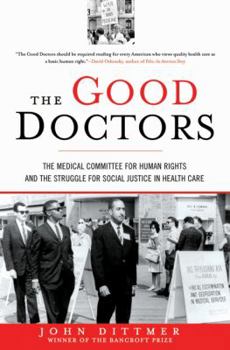The Good Doctors: The Medical Committee for Human Rights and the Struggle for Social Justice in Health Care
Select Format
Select Condition 
Book Overview
In the summer of 1964 medical professionals, mostly white and northern, organized the Medical Committee for Human Rights (MCHR) to provide care and support for civil rights activists organizing black... This description may be from another edition of this product.
Format:Paperback
Language:English
ISBN:1608190935
ISBN13:9781608190935
Release Date:April 2010
Publisher:Bloomsbury Publishing PLC
Length:324 Pages
Weight:0.70 lbs.
Dimensions:0.9" x 6.1" x 8.2"
Customer Reviews
3 ratings
Inspiring
Published by Thriftbooks.com User , 15 years ago
John Dittmer's The Good Doctors: The Medical Committee for Human Rights and the Struggle for Social Justice in Health Care traces a medical organization from its beginnings in the civil rights era to its decline and later demise in the 1980s. A neglected story from the struggle for civil rights, it has ramifications for the ongoing debate over health care reform. The group was originally incarnated as the Medical Committee for Civil Rights in response to the American Medical Association's refusal to promote integration among its member state associations. After a slight name change, volunteers from the MCHR traveled south during the Freedom Summer of 1964. After a narrowly focused beginning , members quickly diversified in interests and became involved in other social movements of the 1960s and 1970s. Dittmer does not overlook the internal tensions within the MCHR, yet his respect for the participants is evident. The book is at its best when describing MCHR activities in the 1960s south. Like his Bancroft Prize-winning book, Local People: The Struggle for Civil Rights in Mississippi, Dittmer relies heavily on interviews and this section of the book reads as oral history. Later sections seem to become unfocused, reflecting the diversification of the MCHR`s activities, and Dittmer tends to use documentary sources. The Good Doctors assumes some existing familiarity with the Civil Rights Era and its participants, but is otherwise suitable for both academic and lay readers alike. It is an excellent history of a neglected participant in the era. The lingering legacy of segregation and the current drive for universal health care on Capitol Hill make this a history book with timely significance.
simply superb
Published by Thriftbooks.com User , 15 years ago
Superbly written (and I would expect nothing less from this author), The Good Doctors examines the creation, role, activism and struggles of the Medical Committee for Human Rights, which started as an organization to help out civil rights workers in the south during the early 1960s. The committee's statement of purpose: "We are deeply concerned with the health needs of the socially deprived. It is our purpose to initiate activities to improve their health status and to provide professional support and assistance to organizations concerned with human rights." (62). That is precisely what the members of this committee (physicians, nurses, other health care professionals) did, whether it be for civil rights workers in Mississippi or other places in the south, or to offer medical aid to those who marched in Selma (and other places). The Committee also worked tirelessly to gather evidence of racial discrimination in the cases of hospitals and medical officials who had taken federal funding but who were actively discriminating against African-Americans not only in the south, but in other parts of the country as well. Members were often attacked by law enforcement while they were in the Jim Crow-ruled American South, making their jobs even tougher but still they kept on with their work. The members set up health clinics and tried to get to the root of social injustice and help locals to gain some sense of self-empowerment. Members were there at Wounded Knee, at Alcatraz, at the Chicago Democratic Convention, at various anti-Vietnam war demonstrations and the list goes on. The Committee worked to try to get the message across to politicians, the AMA and other organizations that health care is not a privilege, but rather a human right, through their efforts to support a national health program. The most impressive part of this book (not that the whole thing isn't great) was Dittmer's examination of how the MCHR went from its original conception to the "medical arm of the new left." From the Black Panthers on down to the Progressive Labor Party in the 1970s and beyond, Dittmer shows how national and local politics, infighting among factions in the local Committee chapters and at higher levels, and other factors changed the face of MCHR as the decades progressed. The changing face of Black activism, taking on a more "Black Nationalism" tone, the wave of ideologies of the revolutionary organizations and parties in the 70s also led to changes in the organization. Dittmer does an excellent job in examining these phenomenon. Finally, not only does Dittmer view the Committee as an entity in its own right, but he goes on in some detail to examine the motivations and backgrounds of the founding members, and those who joined later, as well as the hard and often dangerous being work done by individual members out in the field, anywhere where racism & poverty often kept people in ignorance or prevented people from receiving decent health care or o
Healing Rights
Published by Thriftbooks.com User , 15 years ago
This book outlines a process whereby health care is a human right and not a priviledge. The medical committee for human rights in their committment for social justice in health care creates a path into healing that is attainable. It has long been noted that money buys you better care. This book is an attempt to share ideas on how this is not necessary and what can be done to elicit care as a fundamental obligation to all. The Path into Healing





